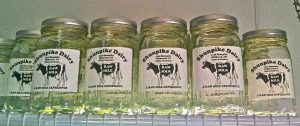It was a rainy morning when all 7 of us Vassar students ventured off campus to explore agriculture in the local environment. Shunpike Dairy was our first stop of the day and will be the focus of this essay. We arrived at Shunpike after the 25 minute car ride and were greeted by a fairly typical small dairy set up. A small barn and adjacent farmstand were planted among faced wooden pastures on a gently sloping and slightly rocky landscape.
Shunpike is a small local dairy that is family run out of Millbrook NY located near the Carry Institute. Shunpike’s heard holds an impressive variety of cows with e Milking Short Horns, Jerseys, Black Jerseys, Linebackers, Brown Swiss and even some Belted Galloways among their ranks. This variety of cow must produce a very interesting tasting milk, because each breed produces a slightly different type of milk as far a butterfat and nutrient richness go. Shunpike also sells their own and other value added products at their farm stand having an excellent farmers cheese available as well as a hard cheese and another farm’s maple syrup. But the crux of Shunkpike is their raw milk.
Raw milk is simply milk that hasn’t been pasteurized yet, the process used to eliminate the potentially harmful bacteria that can live in cows milk. Milk can become contaminated with these bacteria in a variety of ways, usually either the cow get an illness such as mastitius or through improper milking techniques. Mastitis is an infection of the utter that can usually be recognized by farmers observing and clumps, discoloration of blood in the milk or unusual sensitivity on a particular quarter (cow utters are divided into 4 sections called quarters, each with one teat). Cows who aren’t well cared for and are living in germ heavy environments are at higher risk for mastitis and their raw milk shouldn’t be consumed. Improper milking, milk transfer, milk storage, or general facilities could all also lead to the contamination of milk. During most milkings the cows teats are sterilized both before and after using hydrogen peroxide or iodine so make sure no bacteria are pulled off the teat into the milk, or have the chance to infect the teat for the 30 minutes it stays open after milking.
Drinking raw milk is certainly a risk, but it is not inherently unsafe, using best practices and keeping milk clean reduces the risk of infection and raw milk comes with many benefits including better taste, less processing, more profits going directly to small farmers and higher nutrient content to name a few. Shunpike and other small raw dairies are continuing to sell milk the way humans drank milk for thousands of years, and I for one very much appreciate that.
The day concluded with visits to the Vassar Farm and Sprout Creek.


